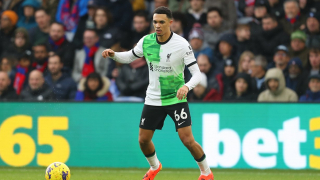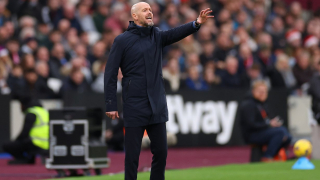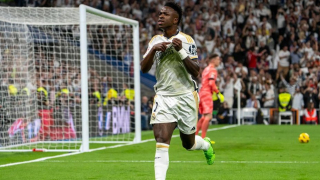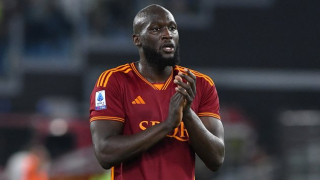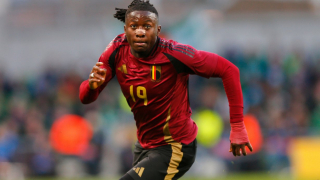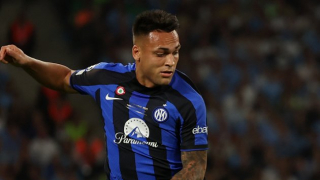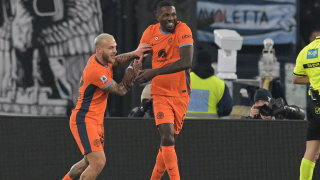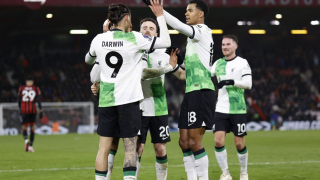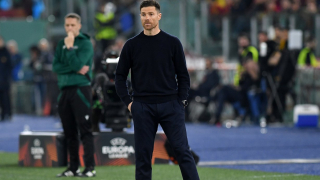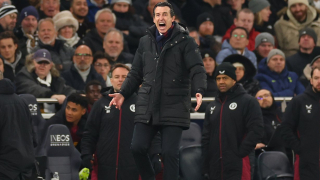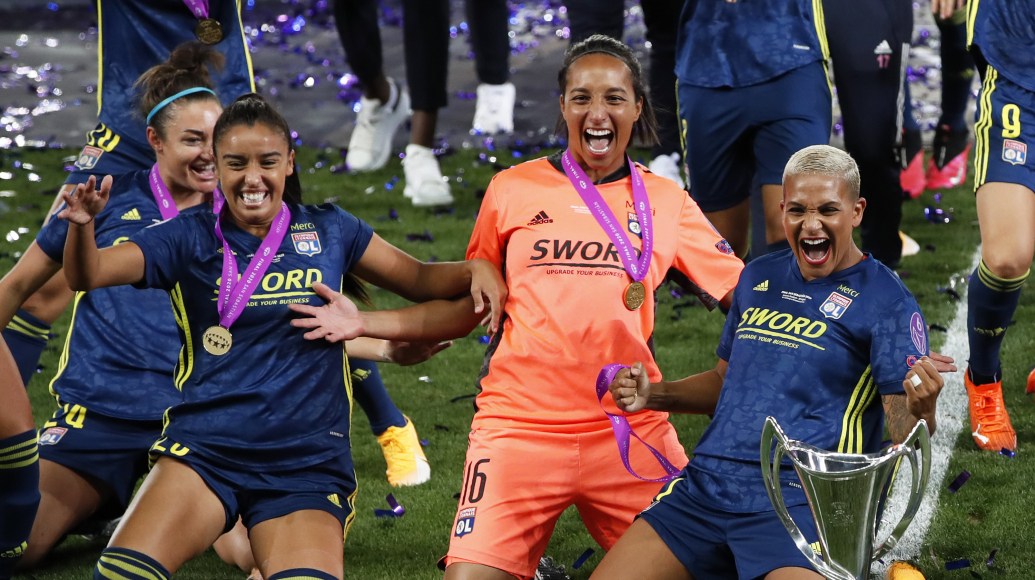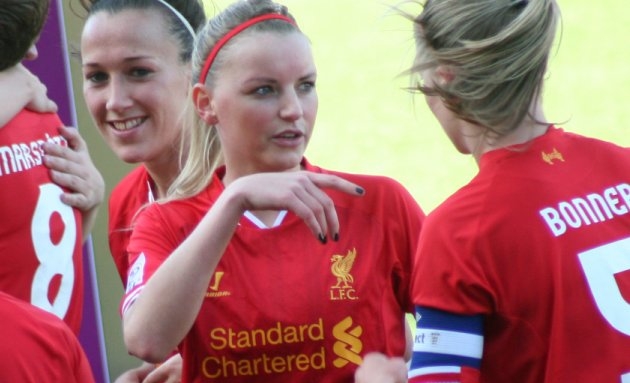This week we look at the final results for the UEFA 2023 Women's World Cup Qualifying Groups in Europe. We also discuss the Intercontinental Playoffs, giving our thoughts and looking at the FIFA rankings of the teams, with one huge surprise in the rankings which should see a seeding for the Oceania Nations Cup Winners Papua New Guinea and a bye to the second and last round.
UEFA Women's World Cup Qualifiers sends 9 Teams to Next Summer's Finals—another 9 sides playoff for 2 more direct UEFA spots and 1 Intercontinental Playoff berth
As of September 6—the end of EUFA's group qualifiers for the 2023 Women's World Cup in Australia/New Zealand—there were nine more Women's World Cup Finalists officially in as their group winners, with all nine sides veterans of the Finals.
- Sweden (Group A winner)
- Spain (Group B winner)
- Netherlands (Group C winner)
- England (Group D winner)
- Denmark (Group E winner)
- Norway (Group F winner)
- Italy (Group G winner)
- Germany (Group H winner)
- France (Group I winner)
In addition, there are nine teams who finished second who will play off for two final direct Women's World Cup Finals spots from UEFA, with a third team going onto the Intercontinental Playoffs in New Zealand early next year along with nine other sides from other FIFA confederations nations. Iceland just missed out on a direct spot from a last-minute goal by Netherlands in their 1-0 win on September 6 in Group C, when a tie would have meant that Iceland were group winners and the 2019 WWC Finalists Dutch fell into the UEFA playoffs instead. The nine second-place finishers included:
- Republic of Ireland (Group A runner-up
- Scotland (Group B runner-up)
- Iceland (Group C runner-up)
- Austria (Group D runner-up)
- Bosnia and Herzegovina (Group E runner-up)
- Belgium (Group F runner-up)
- Switzerland (Group G runner-up)
- Portugal (Group H runner-up)
- Wales (Group I runner-up)
Of the second-place sides, only Scotland (2019) and Switzerland (2015) have ever played in a Women's World Cup Finals before.
It is interesting that only one side from Central or Eastern Europe made the UEFA playoffs—Bosnia and Herzegovina in Group E, who benefitted from the disqualification of Russia, who would likely have finished second to Denmark in Group D and had 15 points after 6 matches when they invaded Ukraine, while Bosnia finished group play with 11 points from 8 matches. However, other Central European nations came close to qualifying for the UEFA playoffs, none more so than Slovenia, who tied Wales in Cardiff on September 6 in their final group match and ended up two points behind the Welsh in the final table. Three other nations who narrowly missed out on second place were Montenegro in Group D—finishing two points behind Bosnia and Herzegovina—Poland, who were only two points behind Belgium in Group F, and Serbia, who finished one point behind Portugal in Group H. Other third place finishers from Central Europe included Ukraine—six points behind Scotland in Group B—Czech Republic—7 points behind Iceland in Group C—and Romania—six points behind Switzerland in Group G. Poland and Serbia in particular had strong WWC qualifying campaigns and their federations need to continue to spend money to support their national team development at all levels, with the next EURO and WWC cycles as a goal to qualify in one or both Finals.
For the Playoffs, the rankings after the group stage among the second place sides, which counted only matches against teams ranked one through five in the six team groups, were: 1) Points; 2) Goal difference; 3) Goals scored; 4) Away goals scored; 5) Wins; 6) Away wins; 7) Lower disciplinary points total; 8) UEFA national team coefficient ranking. In the play-offs, the three best runners-up will be seeded directly to round 2. The six remaining runners-up contest three single-leg play-offs in round 1 on 6 October. The three winners from round 1 and the three teams seeded directly to round 2 will then compete in single-leg play-offs on 11 October. The two play-off winners with the highest ranking (based on results in the qualifying group stage and round 2 play-offs) will qualify for the finals. The remaining play-off winner will compete in the inter-confederation play-offs from 17 to 23 February 2023 in New Zealand.
The rankings before the draw for the nine UEFA Playoff teams were:
1 Switzerland 19 points
2 Iceland 18 points
3 Republic of Ireland 17 points
4 Austria 16 points
5 Belgium 16 points
6 Scotland 16 points
7 Portugal 16 points
8 Wales 14 points
9 Bosnia and Herzegovina 11 points
As the top three rated teams, Switzerland, Iceland and Ireland do not have to play a first-round match as the other six teams do, earning a bye to the six team finals, while also being able to host the single matches. After the draw, the playoff matchups are:
Round 1 Round 2
Scotland vs. Austria in Glasgow Winner vs Republic of Ireland
Wales vs. Bosnia and Herzegovina in Cardiff Switzerland vs Winner
Portugal vs. Belgium in Caldas de Vizela Winner vs. Iceland
We have to say that Switzerland (who qualified for the Finals 7 years ago) and Iceland look very strong, while the Republic of Ireland could upset the form, particularly as they have to only play one match, though after the draw, they have to face either Scotland or Austria away—with neither an easy trip in a one-off match. Austria looked very good at the EUROS (see: The Week in Women's Football: Four takeaways and review from Euros - Tribal Football) and have a very astute young coach and former player in Irene Fuhrmann. Scotland also has a veteran team and experienced their debut WWC in 2019; they looked to be bound for the knockout stage until their late meltdown in surrendering a 3-0 lead over Argentina which ended 3-3—a match that this reporter covered in Paris. The Scots did avoid playing Portugal in the second-round playoff, as Portugal knocked them out of the 2022 Women's EURO in group qualifying by taking all six points with a 1-0 win at home and 2-0 win in Cyprus early in 2020, as COVID was shutting down activities around the world. Belgium, Portugal, Wales and Bosnia and Herzegovina should be proud of their accomplishments, but Australia/New Zealand seems to be a mountain too high for them.
Below we summarize how each of the 9 UEFA Qualifying Groups finished, with some highlights of key players and results.
Group A
Sweden had clinched a Women's World Cup Finals spot before the final matches in September so it was down to Ireland and Finland to decide second place and the playoff spot. On September 1, Ireland qualified for the UEFA playoffs with a 1-0 win at home over Finland, with a goal from first half substitute Lily Agg (28—London City Lions and part of the Irish diaspora as she was born in England and won her third cap) early in the second half. She played one season at Frankfurt in Germany in 2017-18. Ireland thus clinched a second-place berth with Finland four points behind in third, with one Group match left for each.
Lily Agg (#12—third from the right) is engulfed by teammates after scoring the only goal against Finland on September 1 in Dublin, which saw the Republic of Ireland qualify for the UEFA WWC Playoffs (Photo courtesy of BBC News).
The Irish played in front of a record home crowd of 6,952 for a women's international but started nervously and ended the game with only 30% possession compared with 70% for Finland; the Irish had a slight advantage on shots (11 vs. 10), were tied for shots on goal (5 vs. 5) and led in corner kicks (6 vs. 2). With the win, the Irish pulled 6 points off of Finland home and away, which was crucial to their success. Finland was managed by Under-17 manager Marko Saloranta (who has been coaching women with the Finnish Federation for 11 years), who was in charge of the senior team since August 2022 after Anna Signeul stepped down following the Women's EURO 2022, where defeats to Spain, Denmark and Germany in the Group Stage were seen as disappointing for a talented side that did so well in the EURO Qualifiers for the 2022 Finals, finishing top of their group ahead of Portugal and Scotland.
After the last matches on September 6, Sweden finished undefeated in the group with 22 points, the Irish was second with 17 points, Finland was third with 10 points, Slovakia was fourth with 8 points and Georgia finished with 0 points in fifth place and -54 goal differential.
The Irish squad for the Finland and Slovakia matches were:
Republic of Ireland WNT Squad—September 2022 UEAF Women's World Cup Qualifiers
Goalkeepers: Courtney Brosnan (Everton), Grace Moloney (Reading), Megan Walsh (Brighton & Hove Albion), Eve Badana (DLR Waves)
Defenders: Harriet Scott (Birmingham City), Claire O'Riordan (Celtic), Diane Caldwell (Reading), Louise Quinn (Birmingham City), Jessie Stapleton (Shelbourne), Hayley Nolan (London City Lionesses), Chloe Mustaki (Bristol City), Megan Campbell (Liverpool), Áine O'Gorman (Peamount United)
Midfielders: Katie McCabe (Arsenal), Denise O'Sullivan (North Carolina Courage), Ciara Grant (Hearts), Lily Agg (London City Lionesses), Ellen Molloy (Wexford Youths), Jess Ziu (West Ham United), Lucy Quinn (Birmingham City), Isibeal Atkinson (West Ham United)
Forwards: Heather Payne (Florida State University), Amber Barrett (FFC Turbine Potsdam), Leanne Kiernan (Liverpool), Abbie Larkin (Shelbourne), Saoirse Noonan (Durham WFC)
Stapleton and Atkinson were late replacements for four injury victims: Niamh Fahey of Liverpool of the WSL (groin), Jamie Finn of Birmingham City in the English Championship (suspended), Ruesha Littlejohn of Aston Villa in the WSL (foot) and Megan Connolly with Brighton & Hove Albion in the WSL (ribs).
Group B
Ukraine beat Faroe Islands 3-0 away on September 2 with Ukrainian international forward Nadiia Kunina (22)—who has played the last two seasons at Linkoping in Sweden—scoring a brace within the first 15 minutes of the game. She won two league titles at home with Zhytlobud-1.
On September 2, Spain defeated Hungary 3-0 and then defeated Ukraine 5-0 at home on September 6, with Esther Gonzalez (29—Real Madrid) and Alba Redondo (26—Levante) both scoring braces. Also on September 6, Scotland defeated Faroe Islands 6-0 in Torshavn.
Spain finished as group winners by going undefeated and untied with 24 points, Scotland was second with 16 points, Ukraine was third on 10 points, Hungary was fourth on 9 points and Faroe Islands finished fifth on 0 points with a -54 goal difference.
Group C
In Group C, Netherlands and Iceland battled neck-to-neck to win the group in their last group match on September 6. It looked like Iceland would tie the match in Utrecht which would give them the group title before Esmee Brugts (19—PSV Eindhoven) scored a winner for the Netherlands (1-0) in the 93rd minute so Iceland goes into the playoffs. It was a big win for new head coach Andries Jonker, who took over from former Portland Thorns and Washington Spirit head coach Mark Parsons after internal conflict with players and a disappointing defeat in the Women's EURO Finals this summer. Jonker (59) was an interim coach of the Dutch women's side in 2001 and has been an assistant coach at Barcelona and Bayern Munich on the men's side.
Netherlands narrowly won the group with 20 points, with Iceland second on 18 points, Czech Republic third on 11 points, Belarus fourth with 7 points and Cyprus in fifth with 1 point.
Group D
On September 2, Northern Ireland defeated Luxembourg 2-1 away as Sarah Robson (35), of Durham in the English Championship, scored in the 52nd minute; she played a decade ago with FH and Grindavik in Iceland. Amy Thompson (28) of FC Mamer 32 scored for Luxembourg in the 80th minute and then Rebecca McKenna (21) of Lewes in England scored 5 minute later for the winner for the Irish.
On September 6, the top three sides all won as England easily defeated Luxembourg 10-0, with Beth England (Chelsea) and Georgia Stanway (who left Manchester City this summer for Bayern Munich of Germany) notching braces. Austria defeated North Macedonia 10-0 with Nicole Billa (26—Hoffenheim of Germany) scoring three times and Laura Feiersinger (29—Eintracht Frankfurt) adding a brace. Northern Ireland won 3-1 over Latvia, as Latvia took the lead in the 27th minute but then gave away an astounding three own goals—two coming in the 88th minute and 95th minute
England finished with a perfect record of 30 points and an astounding +80 goal difference, Austria finished second on 22 points with a +43 goal difference and Northern Ireland finished third on 19 points—a fine campaign for NI in a tough group—Luxembourg was fourth on 9 points, North Macedonia had 6 points in fifth but with a -52 goal difference and Latvia was sixth with 3 points and a -55 goal difference.
Group E
On the last Group E matchday on September 6, Bosnia and Herzegovina tied Azerbaijan 1-1 away to finish second with forward Minela Gacanica (SFK 2000 Sarajevo) scoring in the 64th minute and Nazlican Parlak (29—Fenerbache of Turkey) scoring the equalizer for Azerbaijan three minutes later in Baku. The two dropped points by Bosnia and Herzegovina opened the door for Montenegro but they fell at home 2-0 to Malta, who scored twice in the first half, and finished two points behind B&H, when a win would have sent Montenegro to the UEFA playoffs instead. Malta's rising star Hailey Bugeja (18), who moved from Sassuolo to the Orlando Pride this summer, said after the match on her Facebook page, "Sometimes, certain moments leave you truly speechless. I know and understand how much this group sacrifices—how many obstacles we face that other people would have no reason to challenge. And yet, we still manage to surprise everyone, sometimes even ourselves because I believe that we still don't understand our true potential. We're looking to the future with enormous enthusiasm. I have immense pride in this group, staff and players for everything they do on the ground and even outside. Forza Malta."
Maria Farrugia (21) [#13 in white] who plays in the English Women's Championship with Durham after a season at Sunderland, battles for the ball with Montenegro's defensive pair of Aleksandra Popovic (23—Tomiris Turan of Kazakhstan) and Darija Dukic (26—Minsk of Belarus) (numbers 3 and 17 respectively). Farrugia scored the winner for Malta in the 28th minute to upset Montenegro at home on September 6 and cost them a possible UEFA WWC playoff berth. (Photo courtesy Malta Football Association/LovinMalta.com).
In Group E, Denmark qualified during the summer and finished with a perfect record of 24 points. With the ongoing war in Ukraine, Russia had compiled 15 points from six games, but all of their remaining games and their points total were cancelled as a result of their invasion of Ukraine. Bosnia and Herzegovina thus finished second on 11 points from 8 games to clinch a playoff berth and Montenegro was third on 9 points. Tied for fourth on seven points were Azerbaijan and Malta who also had identical -11 goal differentials, and disqualified Russia had 0 points after they were disqualified.
Group F
Norway defeated Belgium 1-0 away in Heverlee on September 2 with Tuva Hansen (25) of Brann scoring the winner on the hour mark for her first international goal; the win gave Norway the top spot in the group and a 2023 Women's World Cup finals spot. The win was a nice debut for head coach Hege Riise, who won the Women's World Cup as a player with Norway in 1995 in Sweden.
On September 1, Poland kept its mathematical hopes alive for second with a 2-1 win away over Albania; the host side led after 11 minutes through Qendresa Krasnqi (28), who plays at Hajvalia in Albania. By the thirty-minute mark, Poland had the lead with two goals from Ewa Pajor (25), who has been at Wolfsburg in Germany for years.
Norway dropped only 2 points and finished with 28 points while Belgium was second with 22 points and Poland was a close third with 20 points. Albania finished fourth with 10 points, Kosovo was fifth with 7 points and Armenia was sixth with 0 points and a -70 goal difference.
Belgium's Tessa Wullaert (who joined Fortuna Sittard in the Netherlands this summer after two years at Anderlecht at home) led all goal scorers with 15 during the UEFA qualifiers. Signe Brunn of Denmark (now Olympique Lyon after playing last season with England's Manchester United) was second on 13 goals and 2022 Women's EURO Finalists England's Beth Mead and Germany's Lea Schuller tied for third with 12 goals.
Group G
Italy, Switzerland and Romania were quite competitive, with only 5 points apart entering the final two matchdays in September. Romania defeated Lithuania 7-1 on the road on September 2 ,with veteran Laura Rus (34) of Lokomotiv Stara Zagora of Bulgaria scoring a brace for Romania. On the same day, Italy went on the road to blast Moldovia 8-0 as Arianna Caruso (22) of Juventus scored four games in Chisinau.
Italy finished Group G with 27 points, with only 1 loss in 10 games; Switzerland is through to the playoffs with 25 points, Romania was third on 19 points, Croatia finished fourth on 10 points, Lithuania was fifth on 5 points and Moldova had 1 point with a -48 goal difference.
Group H
Group H was another interesting group with a very close battle for second between Germany, Serbia and Portugal, who were within 5 points of each other after 8 matches. Group H saw a shocking loss for Germany—the upset of the April international window—when they were beaten by Serbia 3-2 on April 12.
On September 2, Portugal defeated Serbia 2-1 in a crucial match with all the scoring coming in the first half. Kika Nazateth (19—Benfica) scored the winner in first half injury time; she played for her country at this summer's Women's EURO in England.
Germany won the group with 27 points, Portugal was second on 22 points, pipping third place Serbia by one point (21), followed by Turkey (10 points), Israel (9 points) and Bulgaria (0 points), the latter had a -36 goal differential.
Group I
In Group I, France has qualified for the 2023 WWC in Australia/New Zealand in April but Wales, Slovenia and Greece were bunched within 3 points of each other after 8 matches.
On September 2, Oulemata Sarr scored four goals—three in the first half—as France blasted Estonia 4-0 away. Also on September 2, Carrie Jones (18) scored the crucial only goal in the 34th minute of Wales' 1-0 win over Greece in Volos. Jones plays with Leicester City on loan in the WSL after two seasons at Manchester United. Slovenia kept pace with a 2-0 win at home in Kranj over Kazakhstan. In the final matchday on September 6, Wales tied Slovenia 0-0 at home in Cardiff, which was enough to send Wales onto the UEFA playoffs.
France finished undefeated and untied on 30 points, Wales was second on 20 points, Slovenia was third on 18 points, Greece finished fourth with 13 points, Estonia was fifth and had 6 points and Kazakhstan finished in sixth with 0 points and a -30 goal difference.
FIFA 2023 Women's World Cup Intercontinental Playoffs Preview
FIFA's first ever Intercontinental Playoff Tournament for Women will be held in February in Auckland and Hamilton on the North Island of New Zealand. As of the latest FIFA rankings of August 5, 2022, the teams' seeding would be as follows:
AFC
Chinese Taipei (38)
Thailand (41)
CAF
Cameroon (59)
Senegal (84)
CONCACAF
Haiti (56)
Panama (57)
CONMEBOL
Chile (39)
Paraguay (51)
OFC
Papua New Guinea (49)
UEFA
TBD
One team will qualify for the Intercontinental Playoffs—the third-place finisher from the following 9 UEFA second place teams in group play, with the 1-9 ranking UEFA's seeding at the end of the group stage and their FIFA ranking in parentheses:
1 Switzerland (21)
2 Iceland (14)
3 Republic of Ireland (26)
4 Austria (20)
5 Belgium (19)
6 Scotland (23)
7 Portugal (27)
8 Wales (30)
9 Bosnia and Herzegovina (63)
All of the UEFA Playoff sides have FIFA rankings of 30 or above and well above all of the Intercontinental Playoff sides, with the exception of Bosnia and Herzegovina at 63, who would be only ahead of Senegal (84).
The seeds for the FIFA Intercontinental Playoffs would be the UEFA side (unless Bosnia and Herzegovina qualifies) along with Chinese Taipei (38), Chile (39), and surprisingly Oceania's Papua New Guinea (49) ,with no seeded team from CONCACAF or CAF
As it sits now, the likely European side and Chinese Taipei would be seeded in groups A or B and thus not have to play a semifinal but advance directly to the final and would only have to play one game. Chile is close behind Chinese Taipei but right now the Asian side has the inside track to a 2023 WWC Finals Berth—a huge advantage for the AFC and a surprise, along with the Philippines direct berth from the AFC Finals earlier this year.
I have expressed my concerns on this format earlier in the summer, particularly in the fact that four of the ten teams will be eliminated after one game by losing in the semifinals and it doesn't seem effective to send 10 teams all the way to New Zealand in total to play one or two games at most, even for three WWC berths (see: The Week in Women's Football: CONCACAF reflection; Arsenal keep Miedema; Man City sign Venezuela star Castellanos - Tribal Football)
This new format has been called by others in the media as "complicated" and "convoluted." An alternate approach for the future would be that the regional confederations have more teams and games played at their regional finals and reduce the number of Intercontinental Playoff teams. All of the CONMEBOL members (10) participated in the Copa America Femenine this summer in Colombia, that doubled as the Women's World Cup regional qualifiers. Paraguay and Chile did not meet in the knockout stage but Paraguay defeated Chile in the group stage 3-2. We suggest reducing the playoff berth to one CONMEBOL team.
CONCACAF had only 8 teams in the finals in Monterrey, Mexico. Panama and Haiti did not meet but could have for a fifth-place match and just one spot in the playoffs.
The same as in CONCACAF could took place in Africa for CAF, where this year Cameroon and Senegal did not meet in the tournament but a fifth-place spot at a second stage of the Repechage could be held to send one team onto the Intercontinental Playoffs.
At the AFC playoffs in India early in 2022, these two sides did meet in a three-team group (with Vietnam, who won the Playoffs and advanced directly) and Chinese Taipei defeated two-time WWC Finals side Thailand 3-0. Again, one team from the AFC could be sent on.
In addition, reducing the number of playoff teams to one from each of the 6 Confederations (including one each from UEFA and the OFC) could allow three home-and-away series for the last three playoff berths, as has been done on the men's side for years, which would at least guarantee each side two matches and one at home. How much revenue will FIFA see from games involving CONCACAF, CONMEBOL and CAF sides in New Zealand early next year? This needs to be calculated into the equation as well.
We understand the COVID has necessitated one-game playoffs on the men's and women's side, but it is important to have home games, particularly for important matches like a WWC playoff berth match, which would help to build the general awareness and interest in the game at home. A quick look of the five regional continental finals (at which four of the five hosts played in the regional championship final) held in July show the importance of home matches and that strong runs by the hosts helped to build general interest and attendance to see the home sides. This included England at the Women's EURO (winning an exciting match in overtime over Germany in front of 87,192, in which the EURO's tournament all-time attendance record was set the first week), Morocco in the Women African Cup of Nations (falling to South Africa 2-1 in the final in front of a great home crowd of 51,000), Colombia (losing to Brazil 1-0 in the Final, of 28,000 in Bucaramanga, after 15,757 came to their semifinal 1-0 win over Argentina in the same city, with 15,000 at the opener a 4-2 win over Paraguay in Cali) and Fiji at the Oceania Women's Nations Cup (losing to Papua New Guinea 2-1 in front of a tournament high of 1,591 in Suva, with only 10,260 attending games throughout the tournament for an average of 604 per match).
Only CONCACAF's tournament did not see a host in the final—Mexico crashed out at the group stage but the final still drew 17,247 July 18 for 1-0 U.S. win over Canada, with a high of 20,522 for the U.S.-Mexico Group match—a 1-0 win for the visitors—on July 11 which drew an average of 5,877 but had 11 games with gates under 5,000, with a low of 2,537 for the U.S. 3-0 semifinal win over Costa Rica on July 14.
The point is that home matches of such importance are vital to building the game around the world and the FIFA Intercontinental Playoffs—while providing drama and 10 teams another chance at three World Cup berths—takes away the opportunity to build interest and enthusiasm for the teams at home, which could take place by reducing the playoffs to six teams and having traditional home-and-away ties for the three berths.
Tim Grainey is a contributor to Tribal Football. His latest book Beyond Bend it Like Beckham on the global game of women's football. Get yours copy today.
Follow Tim on Twitter: @TimGrainey

